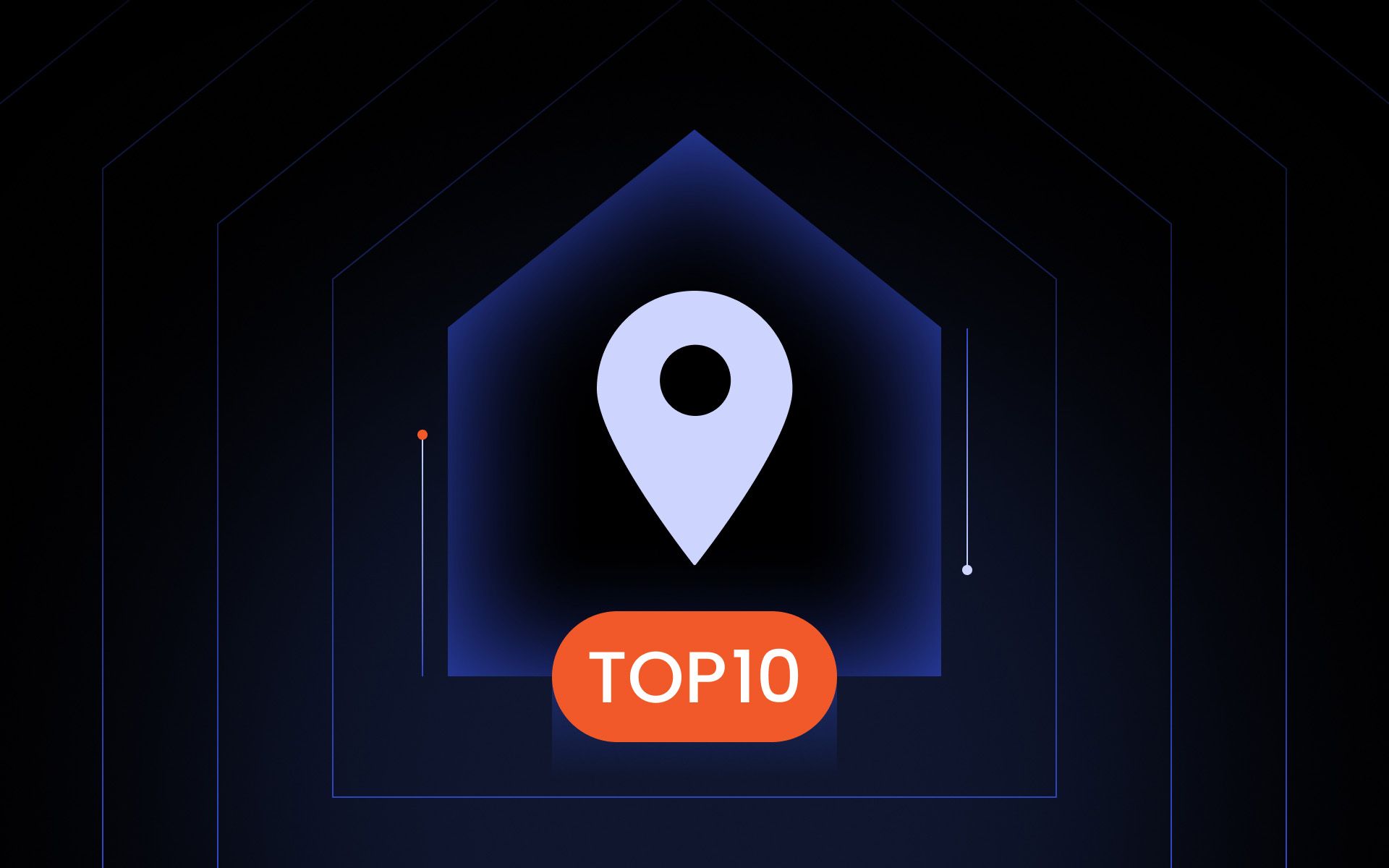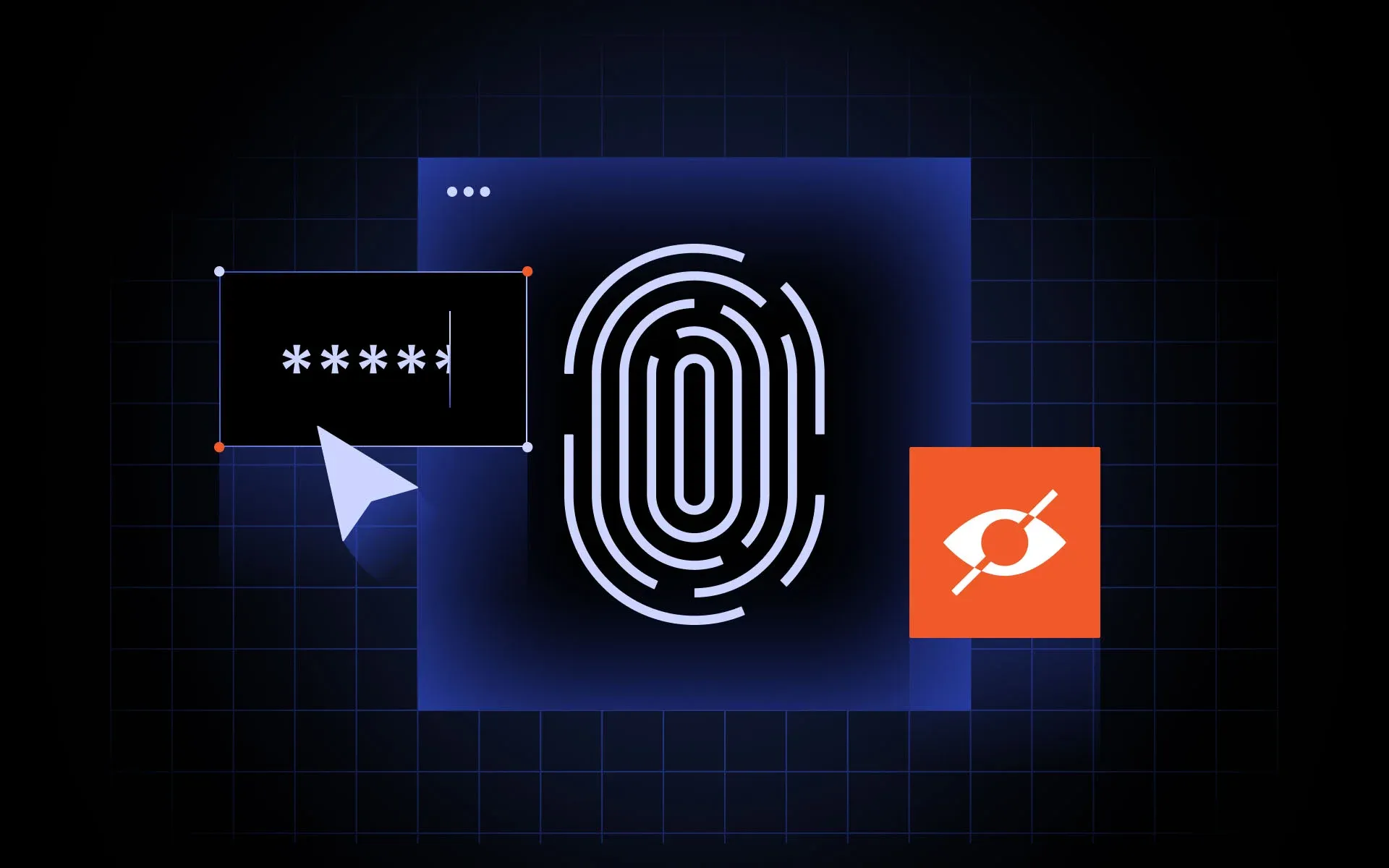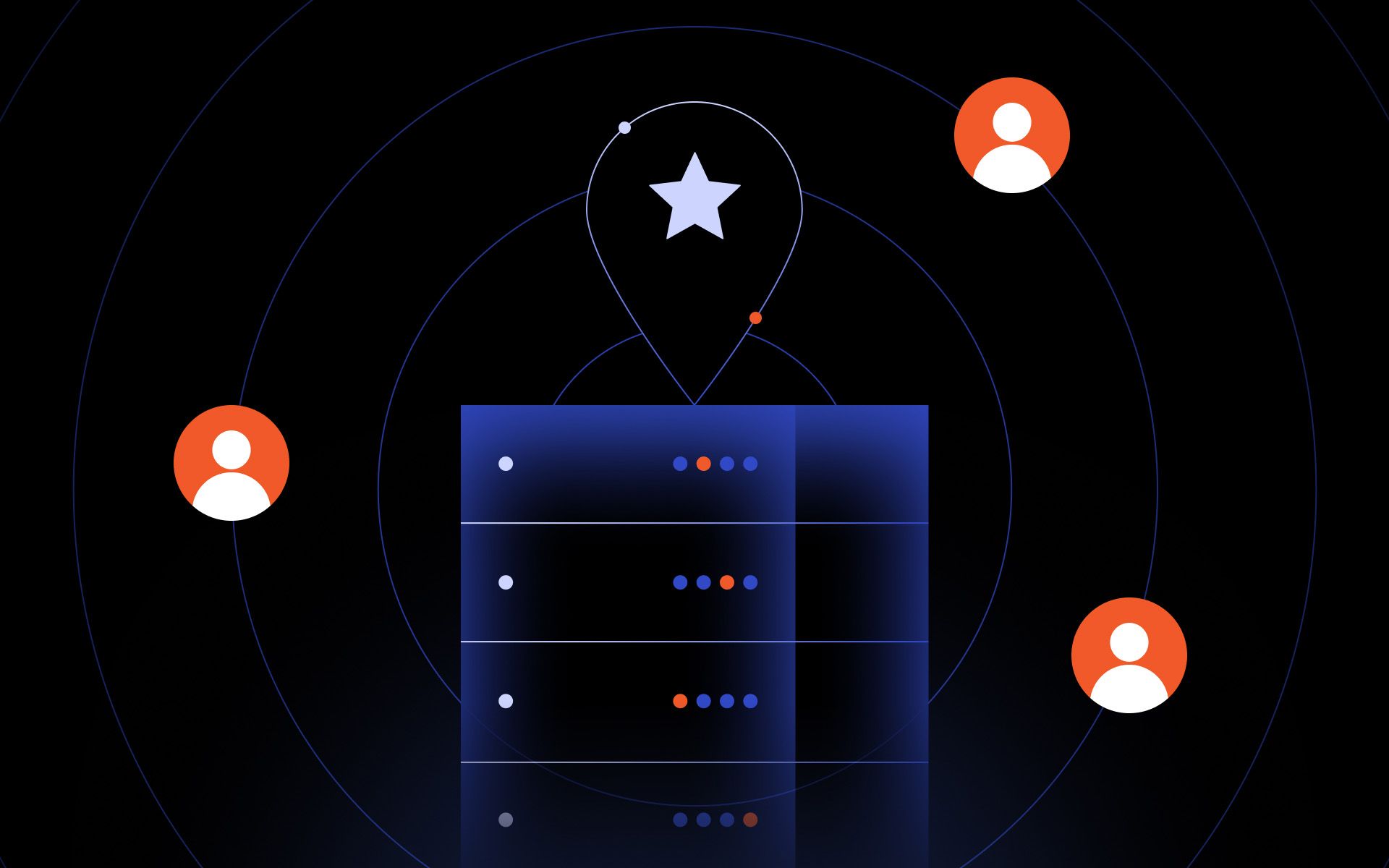Are you tired of unreliable proxies that constantly fail, expose your real IP, or slow down your projects? You’re not alone. Choosing the right residential proxies provider can make or break your online operations.
In 2025, the market is already overcrowded with too many providers promising massive IP pools, unbeatable reliability, and high speed. But not all services live up to the hype. That's why we've evaluated and compared top providers that offer residential proxies by examining their performance, pricing, IP pool size, and use cases.
Whether you're trying to scrape data, run an e-commerce bot, or access location-based content, the right proxy can help you achieve both the speed and security you need for your projects. And it also ensures the stability required to manage multiple accounts and keep your projects running smoothly.
In this guide, we'll walk you through the best 10 residential proxy providers of 2025, explain what they offer, and help you choose the one that perfectly fits your goals.
Best residential proxy providers of 2025
1. MarsProxies
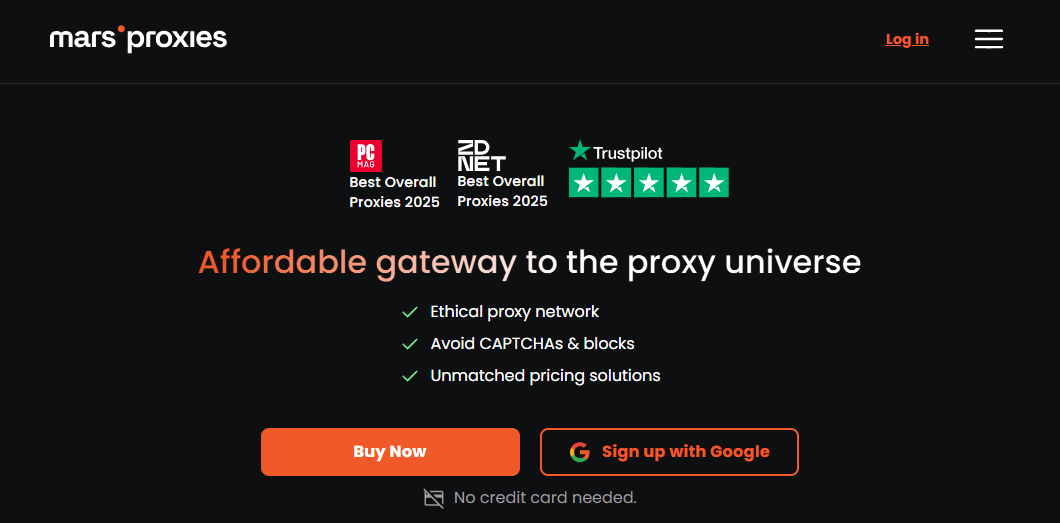
We’re known for our balance between affordability, performance, and ease of use, making us one of the fastest-growing proxy providers of 2025. Our residential proxy IP pool offers over one million residential IP addresses worldwide, making us an excellent choice for users who need reliable geo-targeting without overspending.
With our beginner-friendly dashboard, setting up and managing residential proxies becomes quick, simple, and hassle-free. Our browser extensions and mobile apps make it easy to use proxies on any device.
MarsProxies makes it simple and efficient for both beginners and professionals to use residential proxies for tasks such as data scraping, sneaker copping, or accessing geo-restricted content. And if you encounter any error, our 24/7 online support is available via live chat, email, and Discord.
Key specs
- IP pool: 1M+
- Locations: 190+ countries
- Protocols: HTTP, HTTPS, SOCKS5
- Rotation: Sticky & rotating sessions available
Pricing
- Starts at $4/GB
- Subscription plans are available with bulk discounts
- No setup fees are required
Why it stands out
If you're looking for affordability with a sleek, user-friendly interface, MarsProxies actually combines both and is the best choice for both beginners and advanced users. Their IP whitelisting and flexible rotation options give users full control, while performance tests show consistently low latency and high uptime.
2. IPRoyal
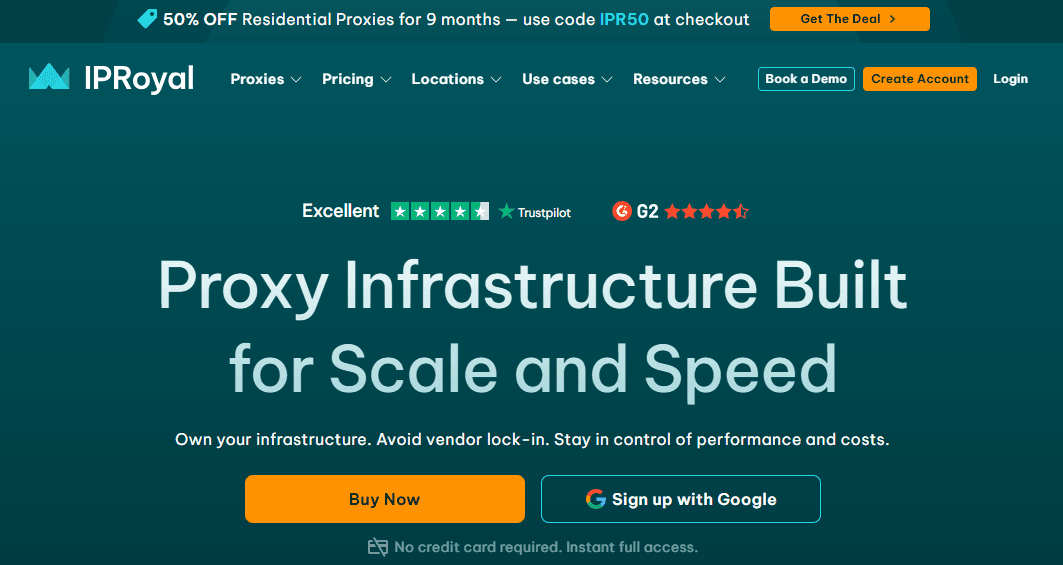
IPRoyal has built a solid reputation as a budget-friendly yet dependable residential proxy service in the market. It is one of the few proxy providers that truly addresses the issue of overspending, especially for individuals, freelancers, and small teams who often struggle with exceeding their budget.
In short, IPRoyal is known for its affordability without compromising on performance. Its proxy network may not be the largest, but it’s more than reliable enough for large-scale tasks like enterprise web scraping, SEO monitoring, social media management, and ad verification.
The speed and consistency IPRoyal’s residential proxies offer are unmatched. Its dashboard is clear, ensuring a straightforward proxy setup process, while still offering many advanced features for enterprise clients.
Key specs
- IP pool: 32M+
- Locations: 195+ countries
- Protocols: HTTP, HTTPS, SOCKS5
- Rotation: Sticky & rotating sessions available
Pricing
- Starts at $7/GB
- Subscription plans are available with bulk discounts
- One of the lowest residential proxies cost options in 2025
Why it stands out
IPRoyal’s shared and dedicated residential proxies allow users to scale based on their needs, while the pay-per-GB model makes them perfect for all kinds of projects. IPRoyal doesn't offer free residential proxies, but their pricing is close enough to feel like it with premium features.
3. Bright Data
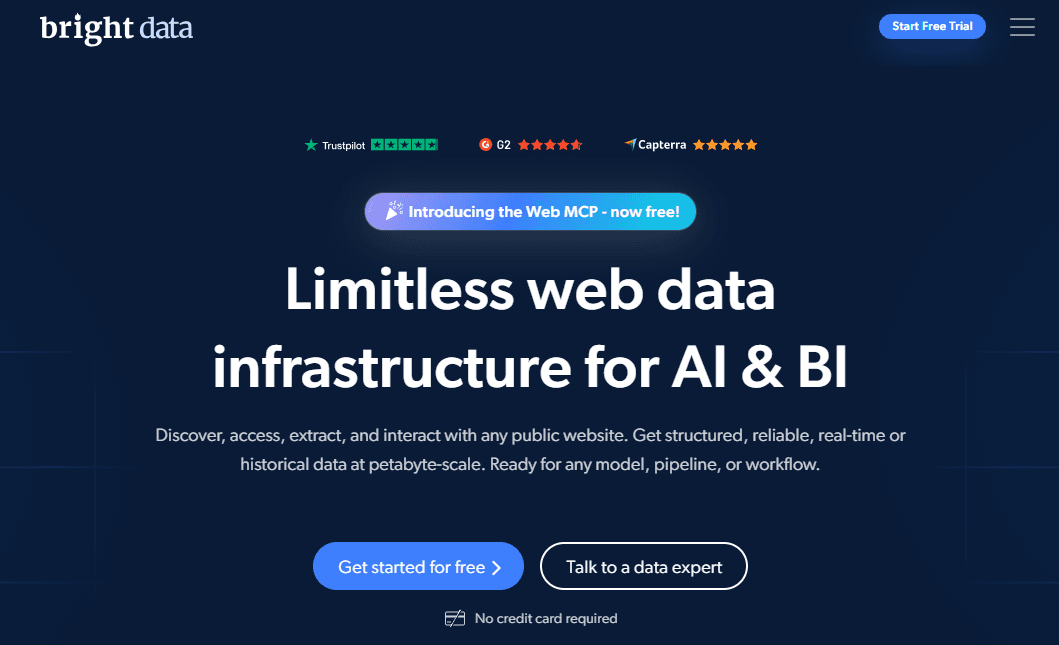
Bright Data (formerly Luminati) is widely regarded as the market leader in the proxy industry. With the largest pool of residential IPs and advanced tools, it’s the go-to provider for enterprises running massive-scale operations.
Whether you’re a digital marketer, data analyst, or sneaker enthusiast, Bright Data’s proxy network gives you access to millions of real IPs powered by genuine internet service providers (ISPs). It’s a well-known name in the industry, and its pricing is also higher than that of most providers on this list.
Key specs
- IP pool: 150M+
- Locations: 195+ countries
- Protocols: HTTP, HTTPS, SOCKS5
- Rotation: Sticky & rotating sessions available
Pricing
- Starts at $8/GB
- Flexible proxy plans tailored for enterprises
- Discounts available for higher volumes
Why it stands out
Bright Data is a great option if you're looking for premium features and don’t mind paying for them. It offers both dedicated and shared residential proxies, which makes it a good choice for various projects.
4. Oxylabs
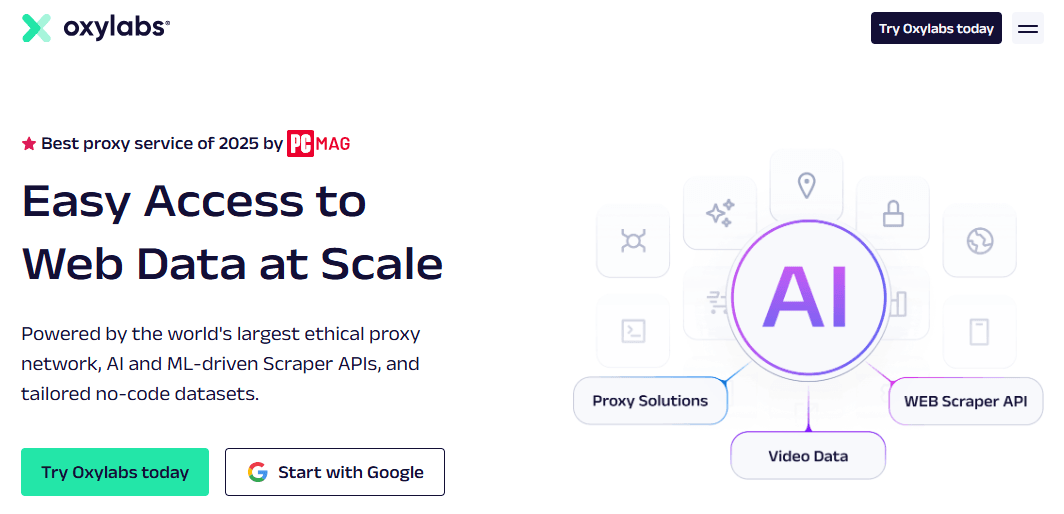
Oxylabs is widely recognized as one of the top residential proxy providers in the market. Trusted by Fortune 500 companies, universities, and large-scale research firms, it’s a true powerhouse in the world of residential proxy networks.
Aside from proxies, Oxylabs also offers AI-powered web scraping tools, real-time data gathering APIs, and other enterprise-grade solutions.
For companies handling sensitive operations like ad verification, brand protection, or SEO tracking, Oxylabs’ residential proxies service ensures compliance, speed, and security at a level few providers can match. While the cost is higher than that of budget providers, the return on investment makes Oxylabs the go-to choice for professionals who can’t afford downtime or inaccuracies.
Key specs
- IP pool: 175M+
- Locations: 195+ countries
- Protocols: HTTP, HTTPS, SOCKS5
- Rotation: Sticky & rotating sessions available
Pricing
- Starts at $8/GB
- Monthly plans start at $300+
- Flexible enterprise-level pricing for high-volume users
- Tailored residential proxies cost structure for large corporations
Why it stands out
Oxylabs stands out because its main focus is to provide reliable, scalable, and innovative proxy services to businesses. Their AI-powered tools, combined with the fastest residential proxies in the market, make them a perfect fit for enterprise-level businesses looking for high accuracy and efficiency for large scale operations.
5. Decodo
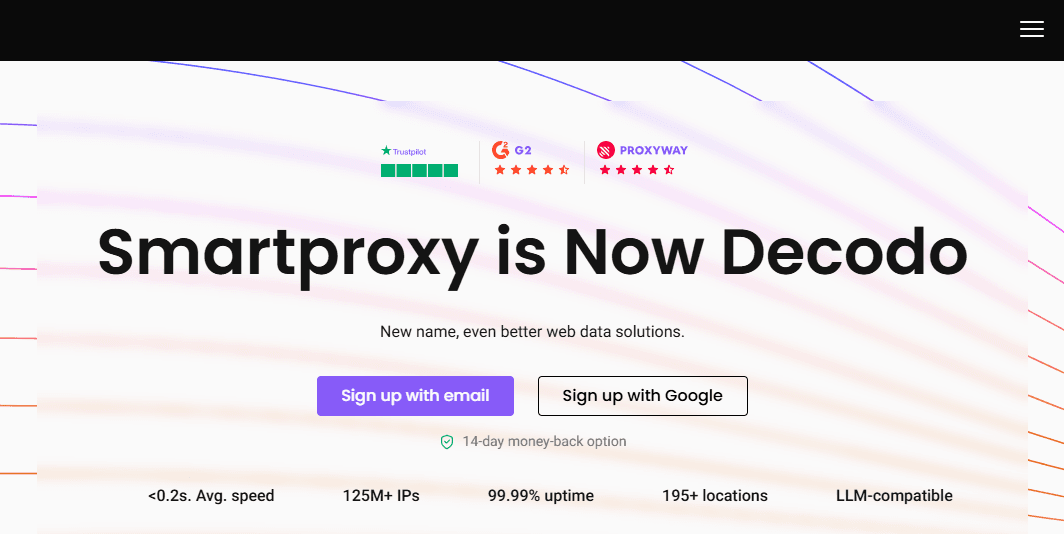
Decodo is an emerging provider that has been making waves in the proxy space due to its competitive pricing and simple setup.
It boasts a network of over 115 million residential IPs sourced from real internet service providers that give its users a dependable way to stay anonymous online. While Decodo doesn’t yet match the giant players in terms of scale, its speed, reliability, and growing IP pool make it an attractive option for small to mid-sized businesses.
The standout feature that Decodo offers is combining rotating residential proxies and static residential proxies through its sticky sessions. This feature helps their users have full control over proxy behavior and connection stability.
Key specs
- IP pool: 115M+
- Locations: 195+ countries
- Protocols: HTTP, HTTPS, SOCKS5
- Rotation: Sticky & rotating sessions available
Pricing
- Starts at $3/GB
- Pay-as-you-go proxy plans are also available
Why it stands out
Decodo strikes a great balance between cost and performance. It’s an ideal residential proxy service for freelancers, small agencies, and startups who need a reliable proxy network without advanced features offered by enterprise-level providers.
6. SOAX
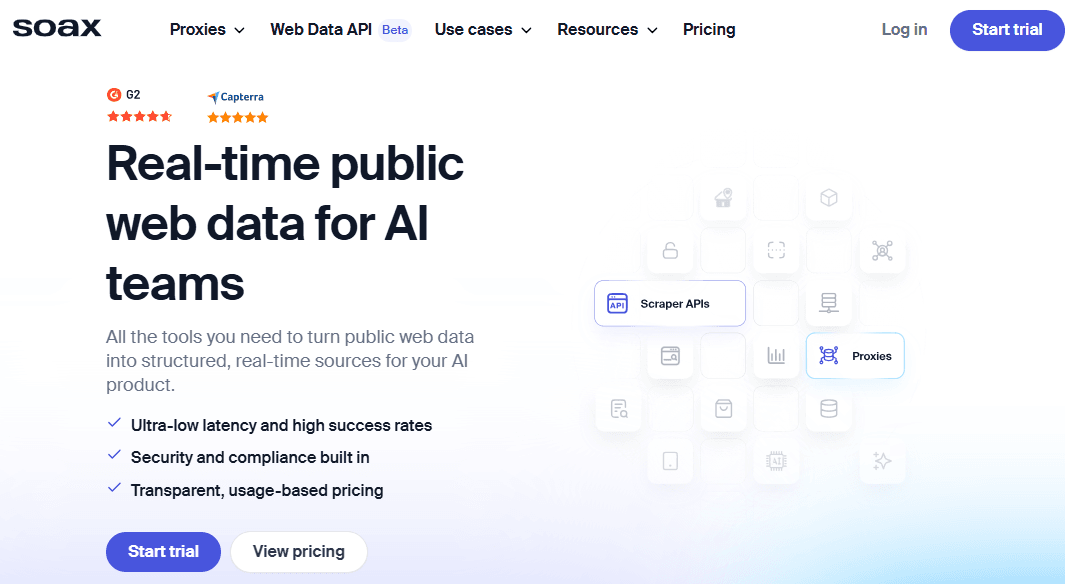
SOAX is highly regarded for its clean and reliable proxy pools, designed to minimize failed requests and IP blocks. SOAX is the best choice for users interested in market research, data scraping, and ad verification with a strong focus on accuracy and success rate.
The provider’s residential proxy network is carefully maintained to provide clean residential IPs with minimal risk of blacklisting. The precision SOAX offers is a differentiator from most proxy providers, thanks to its pool of over 155 million residential IP addresses.
Key specs
- IP pool: 155M+
- Locations: 195+ countries
- Protocols: HTTP, HTTPS, SOCKS5
- Rotation: Sticky & rotating sessions available
Pricing
- Starts at $3.60/GB
- Free trial available for new users
Why it stands out
SOAX focuses on providing “clean” proxies with minimal blacklisting issues, ensuring smoother scraping and higher success rates. It’s ideal for businesses that can’t risk downtime or inaccuracies, and even lets you test the service with free residential proxies before committing.
7. Proxy-Cheap
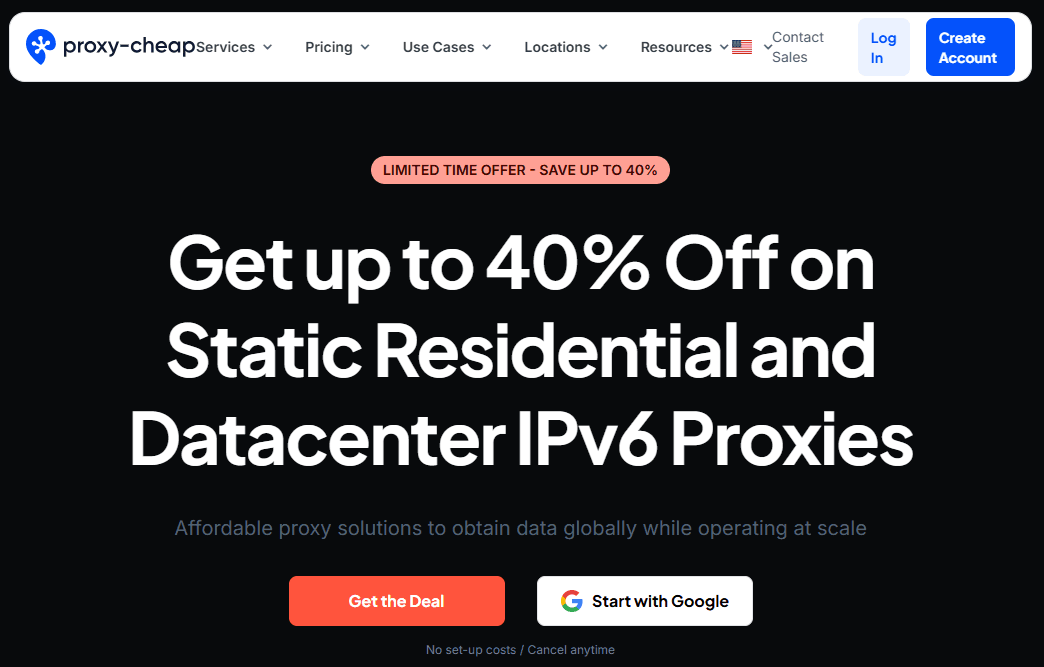
If you're looking for low-cost residential proxy servers with decent coverage and performance, then Proxy-Cheap is the best option in the market. While it doesn’t have the largest pool or the most features, it fills an important gap for individuals and startups who want access to proxies without a major financial commitment.
Proxy-Cheap offers over 85 million residential proxy IPs spread across more than 130 countries, which makes it a reliable residential proxy option for large-scale workloads.
One of Proxy-Cheap’s biggest advantages is the pricing flexibility which enables individuals and small teams to test the service at minimal cost. The starter plan costs just $4.99/GB for rotating proxies, delivering consistent performance for all types of projects. With fully customizable rotation options, tasks like web scraping, SEO monitoring, and ad verification provide accurate and reliable results.
Key specs
- IP pool: 85M+
- Locations: 130+ countries
- Protocols: HTTP, HTTPS, SOCKS5
- Rotation: Sticky & rotating sessions available
Pricing
- Starts at $4.99/GB
- Flexible pay-as-you-go plans available
Why it stands out
Proxy-Cheap’s affordable pricing structure is what makes it stand out from the crowd. You can expect great performance without compromising on stability and scalability. If you're a solopreneur who just wants to start using residential proxies in your operations, then Proxy-Cheap is a reliable option.
8. NetNut
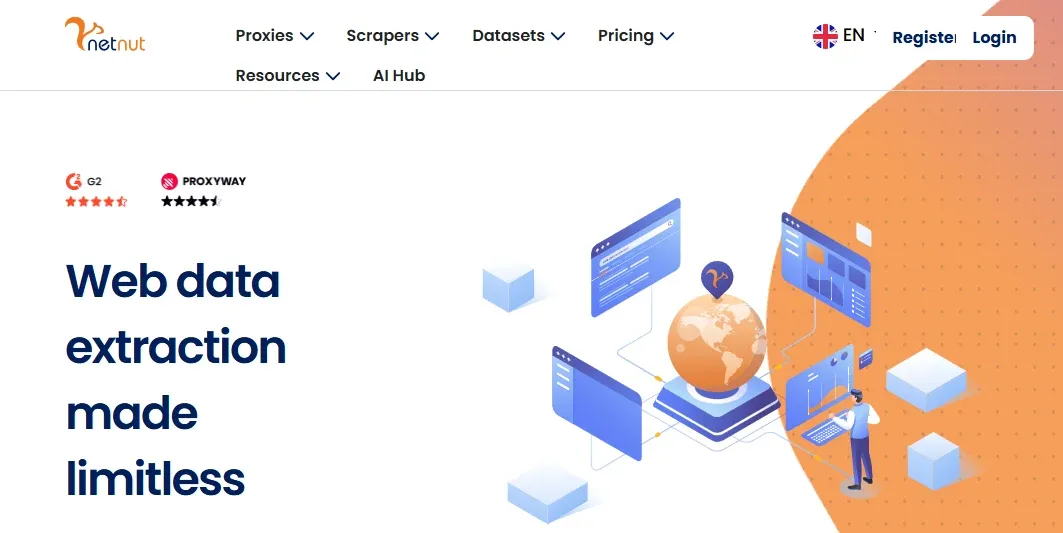
If you're looking for speed, reliability, and direct connections, NetNut is an option worth considering. It provides low-latency proxy servers to clients across the world for large-scale scraping projects, e-commerce automation, and beyond. NetNut’s proxy network is massive, as it offers over 85 million IPs across 195+ countries for both static and rotating residential proxy setups.
NetNut is an enterprise-grade proxy provider with services priced a bit higher than its competitors. Fortunately, their plans are highly versatile, so clients can only pay for the bandwidth they need and scale easily.
Key specs
- IP pool: 85M+
- Locations: 195+ countries
- Protocols: HTTP, HTTPS, SOCKS5
- Rotation: Sticky & rotating sessions available
Pricing
- Starts at $99/month ($3.53/GB)
- Annual discounts available
Why it stands out
NetNut’s IPs provide ultra-stable sessions, making it perfect for long-duration scraping tasks. If you’re looking for residential proxies that prioritize performance and scalability, NetNut stands out. You can test their services with a free residential proxy plan and make an informed decision before committing to their paid options.
9. Infatica
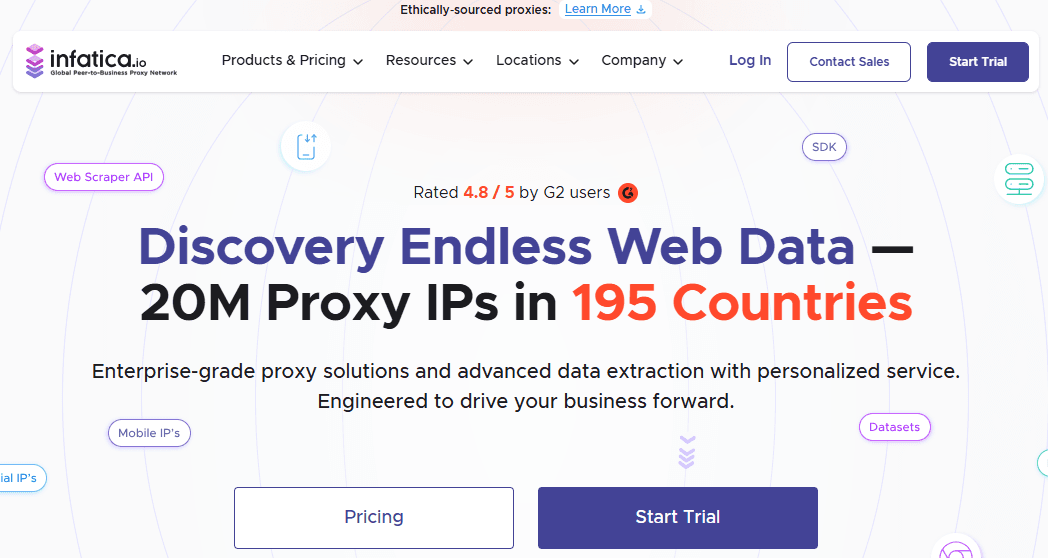
Infatica has carved out a spot among the best proxy providers by focusing on transparency and balanced performance. With Infatica, you'll find stable, reasonably priced, and easy-to-scale residential proxies.
It has over 15 million IPs in the pool, which are spread across 100+ countries. Infatica’s proxies enable you to tailor connections according to whether you need short bursts of fresh residential proxies or longer, more consistent sessions.
Infatica is a mid-range proxy provider, with a pay-as-you-go option starting at $4/GB. They also offer monthly packages starting at $96/month and a free trial to test their services based on your specific needs.
Key specs
- IP pool: 15M+
- Locations: 150+ countries
- Protocols: HTTP, HTTPS, SOCKS5
- Rotation: Sticky & rotating sessions available
Pricing
- Starts at $4/GB
- Monthly plan starts at $96 ($3.84/GB)
- Free trial available
Why it stands out
By offering dedicated proxies that are fast, consistent, and competitively priced, Infatica strikes a balance between affordability and reliability. Their 7-day free residential proxy plans can help you verify if the service meets your project needs before investing in a full plan.
10. Geonode
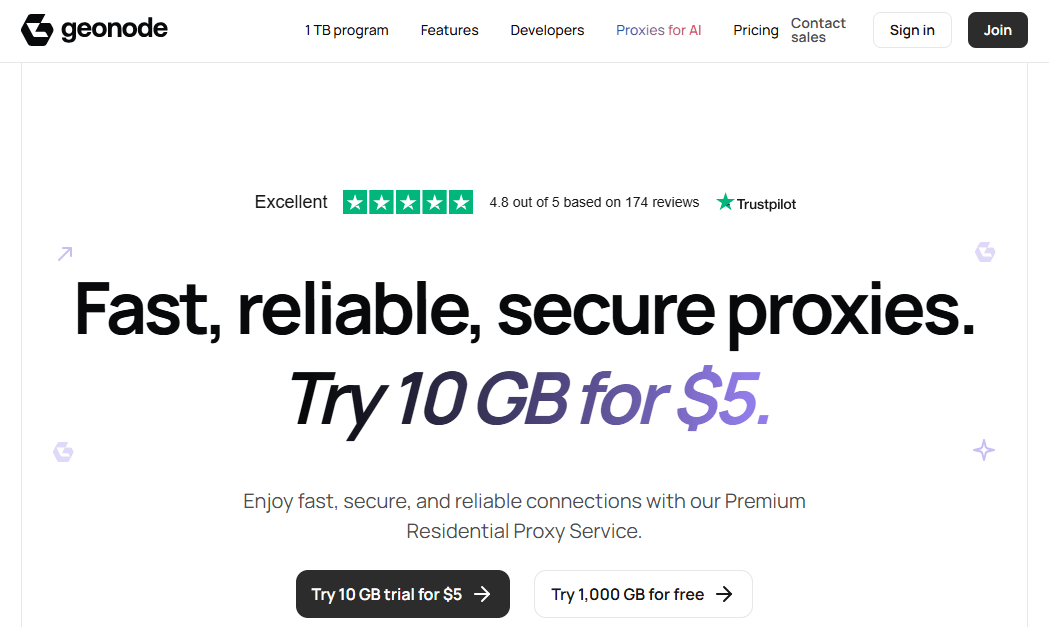
Geonode is a relatively new but rapidly growing proxy provider that focuses on simplicity and automation. The platform is best known for its beginner-friendly dashboard and transparent approach, making it easy for both individuals and businesses to tap into its extensive pool of residential proxies.
With over two million residential IP addresses spread across 190+ countries, Geonode’s proxy servers are suitable for different types of workflows. With affordable pricing and a growing IP pool, it’s becoming a popular choice for new proxy users.
Geonode is a good option for budget-conscious users seeking a competitive pricing structure. Pricing starts at just $3/GB, with straightforward bandwidth plans making it a top choice among freelancers. It’s equally suitable for small businesses and even larger teams who want to manage costs without worrying about hidden fees.
Key specs
- IP pool: 2M+
- Locations: 190+ countries
- Protocols: HTTP, HTTPS, SOCKS5
- Rotation: Sticky & rotating sessions available
Pricing
- Starts at $3/GB
- Bandwidth-based plans available
- No hidden costs
Why it stands out
Geonode combines affordability, ease of use, and solid coverage, making it one of the most balanced proxy providers. Its intuitive platform, low-cost residential proxies, and versatile features make it a smart alternative to both premium residential proxies and unreliable free residential proxies.
Here’s a quick overview of the key details for each provider:
1M+ IPs
190+ countries
HTTP, HTTPS, SOCKS5
Starts at $4/GB
32M+ IPs
195+ countries
HTTP, HTTPS, SOCKS5
Starts at $7/GB
150M+ IPs
195+ countries
HTTP, HTTPS, SOCKS5
Starts at $8/GB
175M+ IPs
195+ countries
HTTP, HTTPS, SOCKS5
Starts at $8/GB
115M+ IPs
195+ countries
HTTP, HTTPS, SOCKS5
Starts at $3/GB
155M+ IPs
195+ countries
HTTP, HTTPS, SOCKS5
Starts at $3.60/GB
85M+ IPs
130+ countries
HTTP, HTTPS, SOCKS5
Starts at $4.99/GB
85M+ IPs
195+ countries
HTTP, HTTPS, SOCKS5
Starts at $99/month ($3.53/GB)
15M+ IPs
150+ countries
HTTP, HTTPS, SOCKS5
Starts at $4/GB
2M+ IPs
190+ countries
HTTP, HTTPS, SOCKS5
Starts at $3/GB
How to choose the right residential proxy provider
When it comes to picking the best residential proxy service provider, it really comes down to what you're trying to accomplish. There are three main questions a provider should answer:
- Can it scale to meet your needs?
- Does the service remain affordable throughout the entire project?
- Are the proxies reliable for sensitive tasks or not?
We use residential proxies in a variety of tasks, from web scraping to managing social media accounts, verifying ads, and browsing the internet privately. The trick is to know what to look for so you don't end up overpaying for features you'll never use or getting stuck with a service that can't handle your workload.
Below are the main factors to consider before making a decision.
Residential vs other proxy types
Before you commit to a particular service, make sure you understand the difference between common proxy types and how they work. Especially if you're looking for other popular options like datacenter and mobile proxies.
- Residential proxies
These proxies use real devices and ISPs, which makes them harder to detect and block. They are the best option for web scraping and other tasks where bypassing location restrictions is mandatory..
- Datacenter proxies
These proxies are easier to detect since they don't originate from real ISPs. On the other hand, they are cheaper and offer better performance, so you should consider them if anonymity is not your top priority.
- Mobile proxies
These proxies provide IPs from mobile carriers, so they’re nearly impossible to block. However, their reliability also makes them the most expensive proxy type. With that said, they’re ideal for highly sensitive workloads.
Pool size & geographic coverage
Residential IP address pool size and diversity are equally crucial when selecting a provider for your project. The larger the pool size is, the less you need to worry about recycling IPs and getting flagged.
For example, if you're running ad campaigns across multiple regions or scraping localized data, you may need a broad geographic coverage. On the other hand, if your work is limited to one or two specific regions, then you can opt for a smaller but more focused IP pool.
Pricing models (bandwidth-based vs IP-based)
Residential proxies pricing is based on two different usage models. One is bandwidth-based and the other is IP-based. Here’s how they work:
- Bandwidth-based
You pay per GB of traffic used. This model is flexible, especially for scraping projects, but costs can add up quickly with heavy usage. The best approach here is to buy residential proxy traffic in bulk, as most providers offer lower pricing per GB for larger orders.
- IP-based
You pay for access to a set number of residential proxies, sometimes with unlimited bandwidth. This is a better option for long-term campaigns where you need stable, dedicated IPs.
In both cases, the key to avoid overpaying is to calculate your expected usage based on your needs and decide which model will work best for you.
Speed & latency
Speed is where every proxy provider differs, as they rely on real residential devices, and it may vary depending on their infrastructure optimization. However, the best providers optimize their infrastructure to reduce latency.
In some cases, more affordable residential proxies may look attractive on paper. However, if you're experiencing high latency, it can ruin your scraping campaigns and cause timeouts.
Customer support & dashboard features
It is really easy to set up and manage your proxies if the dashboard is user-friendly and easy to navigate. When you're deciding on a proxy provider, make sure to look for an intuitive dashboard, clear usage statistics, and additional features that can streamline your operations.
Customer support is even more important. In some cases, you might need the help with residential proxy integration or have questions about specific features. It’s important to find a provider that offers 24/7 support via live chat, email, or other channels, along with detailed documentation.
Free trials & refund policies
Since residential proxy performance depends heavily on your use case, it’s always smart to test before buying, as many providers offer free trials. A good trial should let you test every aspect of the service at no extra cost and last long enough to spot any issues.
If no free trial is available, make sure the provider offers a clear refund policy. A good refund policy also shows the company’s confidence in its service.
Residential proxy use cases
Residential proxies are the backbone of countless modern online operations. From international organizations to solopreneurs, researchers, or even sneaker enthusiasts, these proxies make different kinds of online workflows easier, safer, and faster.
Here are some of the most popular use cases:
Web scraping & data mining
Web scraping and data mining are essential for businesses that use real-world data to enhance their business strategies. However, most modern websites have strict anti-bot systems that block requests if too many of them come from the same IP address.
Residential proxies help gather information from websites without triggering anti-bot systems, ensuring accurate and uninterrupted scraping.
SEO & rank tracking
SEO agencies use proxies to simulate searches from different locations, providing authentic insights into how a website ranks in different search engines. This eliminates misleading data caused by location-based personalization.
Ad verification & brand protection
Ad fraud is a major challenge for businesses, as criminals often provide false data and mislead businesses with fraudulent impressions and clicks. With the help of proxies, it’s easy to verify whether ads are being displayed correctly across different geographies.
Sneaker copping & e-commerce bots
Sneaker copping refers to the use of automated software (known as sneaker bots) to purchase limited-edition items, such as sneakers, at high speed and in large volumes. As rotating residential proxies appear as real users, they bypass strict retailer security systems.
The same approach works for other e-commerce platforms where high-demand products sell out in seconds. Proxies can also help users bypass platform-specific limitations and manage multiple accounts without worrying about being detected and banned.
Streaming & geo-restricted content access
Residential proxies are also very popular among users who need to access geo-restricted content, whether it is streaming platforms, sports broadcasts, or region-locked websites. Proxies make it possible to enjoy content as if you were browsing from that location - all while keeping your connection secure.
Final thoughts
Choosing the right residential proxies provider can make or break the efficiency, reliability, and success of your online project. Regardless of what your goal is, the providers we listed above offer a range of options to fit different needs and budgets.
What is a residential proxy?
Residential proxies use IP addresses assigned by internet service providers (ISPs) to real devices. When you’re using one of these proxies, your traffic appears like that of a regular internet user. This approach helps you avoid detection by websites, safely bypass geo-restrictions, and reduce the risk of bans or blocks.
Which residential proxy is best?
The best residential proxy depends on your specific needs. For personal use or small teams, MarsProxies offers affordable and reliable shared residential proxies. Larger operations require high reliability and advanced features for complex operations. A more suitable provider in that case would be Bright Data, Oxylabs, or IPRoyal.
Which is the best private residential proxy provider?
Private residential proxies give you dedicated IPs that aren’t shared with other users, so they’re ideal for sensitive tasks. MarsProxies offers private residential IPs suitable for account management, targeted scraping, sneaker copping, and more.
Which is the best static residential proxy provider?
Static residential proxies use fixed IPs that do not rotate, ideal for long-term tasks such as account management. NetNut is recognized for its extensive static IP services, delivering consistent connections for streaming and automation.
Which is the best rotating residential proxy provider?
MarsProxies and IPRoyal are a strong choice for budget-friendly rotating residential proxies. Both providers offer flexible rotation options at no extra cost with precise geo-targeting options (country, state, and city level).
Which is the best mass residential proxy provider?
When it comes to enterprise scraping, global SEO tracking, and international market research, Oxylabs is a suitable option due to its robust infrastructure and scraping APIs. As a more affordable option, IPRoyal can also scale to meet medium to large-scale demands.
Which is the best cheap residential proxy provider?
For affordable options, MarsProxies and Proxy-Cheap offer cost-effective plans without sacrificing performance. MarsProxies balances reliability and usability, while Proxy-Cheap offers a low entry price for small projects.
